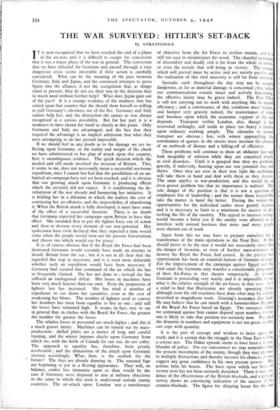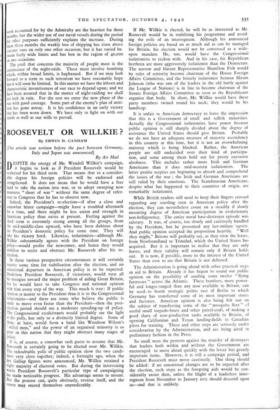THE WAR SURVEYED : HITLER'S SET-BACK
By S TRATEG ICUS
IT is now recognised that we have reached the end of a phase of the air-war, and it is difficult to escape the conclusion that it was a major phase of the war in general. The conviction that we have defeated the Germans and passed through a very dangerous crisis seems inevitable if their action is carefully considered. What can be the meaning of the pact between Germany, Italy and Japan, and the continued attempts to press Spain into the alliance, if not the recognition that, as things stand at present, they do not see their way to the decision they so much need without further help? What does Japan gain out of the pact? It is a strange evidence of the madness that has seized upon that country that she should show herself so willing to pull Germany's chestnuts out of the fire. Germany and Italy cannot help her; and the distraction she causes us was always recognised as a serious possibility. But for her part it is a weakness to have shown her hand so clearly at this point. Only Germany and Italy are advantaged; and the fact that they required the advantage is an implicit admission that what they were attempting to do has proved impossible.
If we should feel in any doubt as to the damage we are in- flicting upon Germany, or the reality and weight of the check we have administered to her plan of attack upon this country, here is unambiguous evidence. The quick decision which she needed and still needs involved the invasion of Britain. This, it seems to me, does not necessarily mean a successful sea-borne expedition, since I cannot but feel that the possibilities of an un- limited air-campaign have not yet been reached, and it is obvious that our growing attack upon Germany is producing effects which she certainly did not expect. It is conditioning the de- velopment of the war already and hampering her initiative. It is holding her in a dilemma in which she realises the cost of continuing her air-offensive and the impossibility of abandoning it. When the British attack is fully developed, it must have some of the effect of a successful invasion. There. is no doubt that Germany expected her campaign upon Britain to have that effect. She intended first to put the fighter force out of action and then to destroy every element of our war-potential. Her spokesmen have even declared that they expected a time wouid come when the people would turn out the present Government and choose one which would sue for peace.
It is, of course, obvious that if the Royal Air Force had been destroyed Germany would certainly have made an attempt to invade Britain from the sea ; but it is not at all clear that she regarded this step as necessary, and it is even more debatable whether such an expedition would have been necessary if Germany had secured that command of the air which she has so frequently claimed. She has not done so ; instead she has suffered an undisguised defeat. Her losses in machines have been very much heavier than our own. Even the proportion of fighters lost has increased. She has tried a number of expedients to cut down her casualties, even at the cost of weakening her blows. The number of fighters used to convoy her bombers has risen from equality to five to one ; and still the losses have remained high. It seems, in fact, true to say in general that, in clashes with the Royal Air Force, the greater the number the greater the losses.
The relative losses in personnel are much higher ; and this is a much graver injury. Machines can be turned out by mass- production: skilled pilots are a matter of long and careful training, and the winter imposes checks upon Germany from which we, with the fields of Canada for our use, do not suffer. The approach to equality has, therefore, been greatly accelerated ; and the dimensions of the attack upon Germany increase accordingly. What, then, is the outlook for the future? The days are already drawing in. The seasonal fogs are beginning to put in a fleeting appearance. They will, on balance, confer less immunity upon us than would be the case if Germany were disposed to aim at military objectives in the sense in which this term is understood outside enemy countries. The air-attack upon London was a transference of objective from the Air' Force to civilian morale, and it still too easy to misinterpret the word. The cheerful endura of discomfort and deadly risk is far from the whole of morale or even the morale that will bring us victory. The courag which will prevail must be active and not merely passive; the realisation of this vital necessity is still far from univer Sporadic raids throughout the day may not be actuall dangerous, as far as material damage is concerned ; but, unles our communications remain intact and actively functioning the effective injury may be grave indeed. The Post Offi is still not carrying out its work with anything like its no efficiency ; and a continuance of this condition must hamper and hamper very gravely indeed, the maintenance of trad and business upon which the economic support of the wa depends. Transport within London, also, though it has recovered strikingly, still tends to place too heavy a burde upon ordinary working people. The obstacles to no transport are obvious ; but, with winter approaching, th continuance of queues in the streets must increase the chance of an outbreak of disease and a falling-off of efficiency.
These problems will continue to show an obdurate face an look incapable of solution while they are conceived merely as civil disorders. Until it is grasped that they are proble gravely, if indirectly, bearing upon our war potential they will thrive. Once they are seen in their true light the authorities will take them in hand and deal with them as they deserve The same applies to war-production, and this would be an even graver problem but that its importance is realised. The sole danger of the position is that it is not a question o employees but of leadership ; and the sooner those responsible take the matter in hand the better. During the winter the . opportunities for the individual raider must greatly increase and it is necessary to limit to a minimum his success in dis- turbing the life of the country. The appeal to increase savings would become a bitter jest if the enemy were allowed so to interfere with normal business that more and more people were thrown out of work.
Apart from this we may have to prepare ourselves for a transference of the main operations to the Near East. If this should prove to be the case it would not necessarily mean that the danger of invasion, or even of further mass-attemp:s to destroy the Royal Air Force, had ceased. In the present war opportunism has been an essential feature of German strategy. For the improvement of the campaign against Egypt and the vital canal the Germans may transfer a considerable prorortion of their Air-Force to that theatre temporarily. At r%setii Graziani is proceeding very warily, and it is impossible to say what is the relative strength of the air-forces in that area. It Is a relief to find that Hurricanes are already operating there although even the old machines have done what may be soberly described as magnificent work. Goering's assurance dies hard. He may believe that he can smash with a hammer-blow the part of the Royal Air Force based on Egypt. The resources which we command against him cannot depend upon number; tut no one is likely to take that position too seriously now. Protided the disparity in numbers and equipment is not too great, quality can cope with quantity.
It is the part of courage and wisdom to insist upon the truth; and it is certain that the struggle in the Near East will be a serious test. The Dakar episode seems to have been a se -ions blunder of policy. For our reassurance we may remember that the present movements of the enemy, though they may promise counter-blockade. The figure for shipping losses for the last
do not
to multiply distractions and thereby increase his chances, suggest any great confidence in his own present powers. His actions belie his boasts. The basis upon which our bore of victory rests has not been seriously disturbed. There is new evi- dence of the effectiveness of the British blockade, and a general survey shows no convincing indication of the success of his week accounted for by the Admiralty are the heaviest for three months; but the wider use of our naval vessels during the period for other purposes sufficiently explains the increase. During these three months the weekly loss of shipping has risen above too,000 tons on only one other occasion; but it has varied be- tween fairly wide limits and has ben in the region of 40,000 on two occasions.
The peril that concerns the majority of people most is the continuance of the night-raids. These must involve bombing which, within broad limits, is haphazard. But if we may look forward to a term to such terrorism we have reasonable hope that it will soon be limited. In this matter we have the inborn and characteristic inventiveness of our race to depend upon; and we have been assured that in the matter of night-raiding we shall not look in vain. For the rest we enter the new phase of the war with good courage. Some part of the enemy's plan of attri- tion has gone astray. It is his confidence in an early victory that has been worn down. We have only to fight on with our minds as well as our wills to prevail.



























 Previous page
Previous page